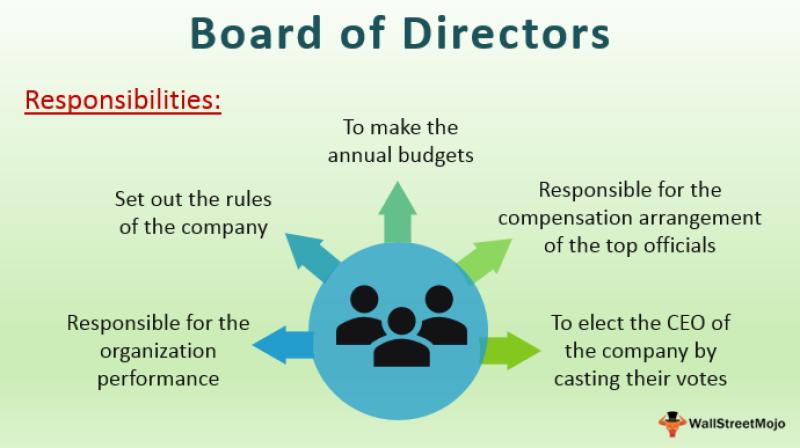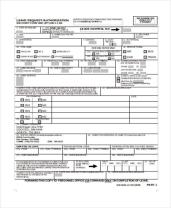What are the functions of Board of directors?
The Board of Directors plays a crucial role in the governance and strategic direction of a company. The functions of the Board of Directors include a range of responsibilities aimed at overseeing the management, protecting the interests of stakeholders, and ensuring the long-term success of the organization. Here are some key functions and roles of a Board of Directors:
Strategic Planning:
- Participate in the development and approval of the company's strategic objectives and long-term plans.
Governance Oversight:
- Establish and review corporate governance policies and practices to ensure transparency, accountability, and ethical conduct.
CEO Selection and Evaluation:
- Hire, evaluate, and, if necessary, replace the Chief Executive Officer (CEO) and other top executives.
Financial Oversight:
- Review and approve financial statements, budgets, and major financial decisions. Monitor the financial health of the company.
Risk Management:
- Identify, assess, and manage the major risks faced by the company. Establish risk management policies and processes.
Compliance and Legal Oversight:
- Ensure compliance with laws, regulations, and ethical standards. Oversee legal matters and risk mitigation.
Succession Planning:
- Develop and implement succession plans for key executive positions, including the CEO and other top management roles.
Stakeholder Relations:
- Represent the interests of shareholders and other stakeholders. Communicate with shareholders and address their concerns.
Dividend Declarations:
- Approve the declaration of dividends and distribution of profits to shareholders.
Mergers and Acquisitions:
- Evaluate and approve major business transactions, including mergers, acquisitions, and divestitures.
Executive Compensation:
- Set and approve executive compensation, including salaries, bonuses, and stock options.
Audit Committee Oversight:
- Establish and oversee an audit committee responsible for reviewing the company's financial reporting and internal controls.
Ethical and Social Responsibility:
- Promote ethical behavior and corporate social responsibility. Consider the impact of business decisions on the broader community and environment.
Board Committees:
- Form committees (e.g., audit committee, compensation committee, nominating committee) to focus on specific areas of governance and oversight.
Monitoring and Evaluation:
- Regularly assess the performance of the company, management, and the Board itself. Implement improvements based on evaluations.
Shareholder Engagement:
- Engage with shareholders and solicit their input on important matters. Address concerns and maintain open communication.
Technology and Innovation:
- Stay informed about industry trends, technology advancements, and innovation. Provide guidance on the adoption of new technologies.
Crisis Management:
- Be prepared to respond to crises and unexpected events. Develop and implement crisis management plans.
Corporate Culture and Values:
- Establish and promote a corporate culture aligned with the company's values. Set the tone for ethical behavior and organizational culture.
Long-Term Sustainability:
- Focus on the long-term sustainability and success of the company, considering both financial and non-financial factors.
The Board of Directors works collectively to fulfill these functions, and individual directors bring diverse expertise and perspectives to contribute to the decision-making process. Effective corporate governance relies on the diligence and commitment of the Board in carrying out its roles and responsibilities.
The Guardians of the Ship: Understanding the Board of Directors
The Board of Directors serves as the guiding force and ultimate authority in an organization. They navigate the corporate waters, ensuring smooth sailing and long-term success. Let's explore their functions, responsibilities, and impact:
1. Functions and Responsibilities:
- Strategic Guidance: Setting the organization's long-term vision, mission, and direction.
- Oversight and Accountability: Monitoring management's performance, ensuring legal and ethical compliance.
- Risk Management: Identifying and mitigating potential risks to the organization.
- Resource Allocation: Approving budgets, overseeing financial performance, and allocating resources for growth.
- Board-Management Relations: Setting the CEO's performance goals and providing guidance and support.
- Selecting and Appointing Key Executives: Choosing the CEO, CFO, and other key leadership positions.
2. Corporate Governance and Decision-Making:
- The Board acts as a check and balance on management: Their independent perspective and oversight ensure responsible decision-making.
- They approve major decisions: Mergers, acquisitions, large investments, and strategic shifts all require Board approval.
- They set policies and procedures: Governing how the organization operates, ensures transparency, and mitigates risks.
3. Individual Board Member Roles:
- Chair: Leads Board meetings, sets agendas, and ensures the Board functions effectively.
- Committee Members: Serve on smaller committees like audit, compensation, or nominating committees, focusing on specific areas.
- Independent Directors: Provide an objective perspective and hold management accountable to shareholders.
4. Composition and Structure Variations:
- Board size: Can range from a few members to over a dozen, depending on the organization's size and complexity.
- Diversity: Increasingly emphasis on diversity in terms of gender, ethnicity, and experience.
- Board Committees: Committee structures and focus areas can vary based on the organization's needs.
- Term Lengths: Directors typically serve staggered terms to ensure continuity and stability.
5. Legal and Ethical Obligations:
- Duty of Care: Act with diligence and prudence in the best interests of the organization.
- Duty of Loyalty: Avoid conflicts of interest and prioritize the organization's well-being above personal gain.
- Duty of Obedience: Uphold the organization's bylaws and applicable laws and regulations.
- Ethical Codes: Many organizations have specific ethical codes of conduct for Board members.
The Board of Directors plays a crucial role in ensuring good governance, ethical leadership, and long-term success for an organization. By understanding their functions, responsibilities, and obligations, we can appreciate their valuable contributions to the corporate landscape.
Remember, the effectiveness of a Board depends on its composition, structure, and individual members fulfilling their roles diligently and ethically. By upholding these principles, Boards can steer their organizations towards a bright and sustainable future.













